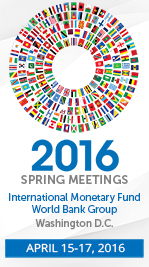
Nick Shaxson ■ Panama makes a concession – and G20 offers some buzzwords

 From the Buenos Aires Herald, on Friday:
From the Buenos Aires Herald, on Friday:
“Panama has caved into the broad front of criticism over its banking practices and has decided to adopt international tax reporting standards, the Organization for Economic Cooperation and Development (OECD) chief José Ángel Gurría said yesterday, calling the turnaround a beneficial impact of the “Panama Papers” controversy.”
Which is good news, as far as it goes – but of course Panama has for decades made a business model out of disregarding not only the laws of other jurisdictions, but also its own weak laws. Many further countermeasures – including against private sector players – now need to be thrown into the pot.
Next, a G20 communique, from the IMF and World Bank “spring meetings” over the weekend. The relevant sections read:
“The G20 reiterates the high priority it attaches to financial transparency and effective implementation of the standards on transparency by all, in particular with regard to the beneficial ownership of legal persons and legal arrangements. Improving the transparency of the beneficial ownership of legal persons and legal arrangements is vital to protect the integrity of the international financial system, and to prevent misuse of these entities and arrangements for corruption, tax evasion, terrorist financing and money laundering. The G20 reiterates that it is essential that all countries and jurisdictions fully implement the FATF standards on transparency and beneficial ownership of legal persons and legal arrangements and we express our determination to lead by example in this regard. We particularly stress the importance of countries and jurisdictions improving the availability of beneficial ownership information to, and its international exchange between, competent authorities for the purposes of tackling tax evasion, terrorist financing and money laundering. We ask the FATF and the Global Forum on Transparency and Exchange of Information for Tax Purposes to make initial proposals by our October meeting on ways to improve the implementation of the international standards on transparency, including on the availability of beneficial ownership information, and its international exchange.
9. We reaffirm our resolve to combat decisively and tackle all sources, techniques and channels of terrorist financing. We call on all countries and jurisdictions to join us in these efforts, including through swift and effective implementation of FATF standards, the new Consolidated Strategy on Combating Terrorist Financing, and provisions of the UN Security Council Resolution 2253. We ask the FATF, working with the relevant IOs, to strengthen its work on identifying and tackling loopholes and deficiencies that remain in the financial system and ensure that the FATF standards are effective and comprehensive, and fully implemented. We call on the FATF-style regional bodies to be vigorous partners. We call on the IMF, OECD, FSB, and the World Bank Group to support FATF in addressing the evolving challenges by bringing in their own analysis, within their respective areas of expertise, of the sources, techniques and channels of illicit financial flows.”
Should this be welcomed? Well, in the spirit of our recent rather sniffy blog about a transparency statement by the group of five European countries, we find much in here to be disappointed by. Mostly, it’s a question of omission.
Lots of mentions of ‘transparency’ but where, for example, is the mention of ‘registers’ of beneficial ownership (let alone public registers)? Where is the word ‘automatic’ in the context of information exchange? It all seems rather fuzzy and buzzword-y.
Related articles

🔴Live: UN tax negotiations
Just Transition and Human Rights: Response to the call for input by the Office of the UN High Commissioner for Human Rights
13 January 2025

Tax Justice transformational moments of 2024

The Tax Justice Network’s most read pieces of 2024

Breaking the silos of tax and climate: climate tax policy under the UN Framework Convention on International Tax Cooperation.
Seven principles of good taxation for climate finance
9 December 2024

Joint statement: It’s time for the OECD to walk the talk on human rights

Did we really end offshore tax evasion?
The State of Tax Justice 2024

EU public consultation on the Anti-Avoidance Directive



If we clamp down on the loopholes without demanding monies for taxes owed, including penalties, then we might as well all joi in because closing the door know is like shutting out the thieves after they’ve already taken everything.